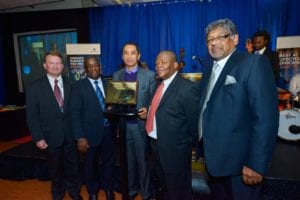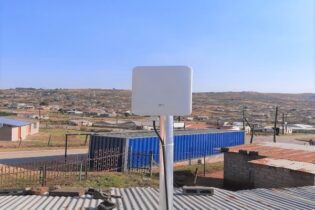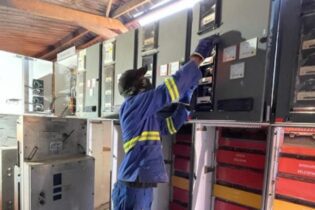The South African International Maritime Institute (SAIMI) was launched at the beginning of November in Nelson Mandela Bay to maximise participation in the global ‘blue economy’.
Founded as an initiative of the South African Maritime Safety Authority (SAMSA), in partnership with Nelson Mandela Metropolitan University (NMMU), the institute will promote and coordinate maritime education, skills development and research to support South Africa in harnessing the potential of its mostly untapped maritime resources. NMMU Vice-Chancellor Prof Derrick Swartz says, “We live in the age of the knowledge economy. We need a new generation of skills, knowledge and technological innovation to develop the industry and enable South Africa to identify its unique niches in the global maritime economy.” “We need to stimulate bright young people to pursue careers in the maritime industry, and we need to ensure the right qualifications are in place to provide them with a career pathway, and knowledge and skills that meet the needs of industry into the future.” The institute will initially be hosted at the NMMU in Port Elizabeth, with a network of maritime centres in the Western Cape, KwaZulu-Natal and Gauteng, and a vision to become a fully-fledged maritime university. Commander Tsietsi Mokhele, SAMSA CEO, says, “The vast potential of South Africa’s more than 2 500km of coastline extends beyond ‘fish and food’ into tourism and marine leisure activities. The areas with the most potential for maritime economic development are marine transport and shipping, oil and gas, fisheries and aquaculture, and maintenance.”“The establishment of SAIMI forms part of SAMSA’s strategy to ‘unlock the potential of South Africa’s oceans and position the country as a leader in all things maritime’. SAMSA remains focused on promoting South Africa’s maritime interests by bringing together role players in industry and facilitating programmes that will benefit South Africa’s economy.”
On the selection of the Eastern Cape and NMMU as the initial host of SAIMI, Mokhele said: “The Eastern Cape is well-positioned. They have got maritime and transport infrastructure. They are very strong on marine sciences. They’ve got a lot of projects in the water supporting marine sciences, and very active leadership.” As a first signal of SAIMI’s international partnerships and industry support, the Vice-President of Finnish global ship power company Wärtsilä, Aaron Bresnahan, handed over a R6.2-million ship engine to SAIMI at the event at the Nelson Mandela Bay Stadium. The engine, to be housed in NMMU’s Engineering Faculty, is supported by training material and 3D ‘walk-through’ technology to give maritime engineering students the opportunity to gain theoretical and practical knowledge of the latest in ship engine design and technology. Key stakeholders in maritime education and economic development have formed the steering committee to guide the strategic direction of SAIMI. In addition to SAMSA and NMMU, the steering committee has representatives from the Department of Higher Education and Training, the Department of Science and Technology, Transnet and the Transport Education and Training Authority (TETA).






